Politics
At UN-led Cyprus talks, TRNC insists only 2-state solution viable
A federation-based solution for the island of Cyprus is off the table, Ersin Tatar, president of the Turkish Republic of Northern Cyprus (TRNC), reiterated on Thursday following talks at U.N. headquarters.
“We will never compromise our sovereignty. If there is to be an agreement, it will be based on the equal sovereignty of two separate states,” Tatar told reporters in New York.
The informal meeting on Cyprus was held under the auspices of the U.N. Secretary-General Antonio Guterres, who described the talks as “constructive” and said the leaders of the ethnically divided island had agreed to continue discussions aimed at building confidence.
The talks followed a similar meeting hosted in Geneva in March and aimed at facilitating an exchange of views on developments in six key cooperation areas previously agreed upon by the Turkish Cypriot and Greek Cypriot sides.
Greek Cypriots control the southern part of the island and are recognized by the international community as a state, despite protests from Turkish Cypriots and Türkiye.
The TRNC, located in the northern part of the island, is recognized by Türkiye, which is a guarantor state in the resolution of the decades-long “Cyprus question.”
Türkiye’s Foreign Minister Hakan Fidan, Greek Cypriot leader Nikos Christodoulides, the foreign minister of Greece, George Gerapettis and the U.K. Minister of State for Europe, North America and Overseas Territories, Stephen Doughty, also attended the meeting.
Greece and the U.K. are other guarantor states in the process.
Tatar stressed Thursday that formal negotiations on the Cyprus issue will not resume unless the sovereign equality and international status of Turkish Cypriots are recognized.
“We obviously, in the last four years, have consolidated our new policy that unless our sovereign equality and equal international status is reaffirmed, we will not resume formal negotiations for the resolution of the Cyprus problem,” he noted.
“Because we believe very much that these assets, our sovereign equality and international status, they are our inherent rights.”
The talks in Geneva focused on exploring areas of cooperation between the two sides on the island, rather than reaching a final resolution on the status of the communities.
Eventually, the sides agreed upon the opening of new crossing points in the divided island where Greek Cypriots and Turkish Cypriots are separated by a U.N. buffer zone, clearance of land mines, cooperation on environment and climate change, solar-powered electricity production in the buffer zone, restoration of cemeteries and the establishment of a joint technical committee for the youth.
Although progress was reported in some topics discussed in Geneva, cooperation stalled in others, such as the clearance of mines and electricity production, due to the uncompromising stance of the Greek Cypriot side.
On Thursday, Guterres said Greek and Turkish Cypriot communities would press ahead with attempts to open new crossing points between the two sides and cooperating on solar energy initiatives.
“It is critical to implement all these initiatives as soon as possible, for the benefit of all Cypriots,” Guterres said.
There are presently nine crossing points along a 180-km-long (116-mile-long) cease-fire line splitting the two sides. Guterres said there was a “question of itinerary” in relation to one of the new checkpoints opening but that there had been important progress on the issue.
Following the meeting, Tatar said that the Greek Cypriot side had sought to have a new road built in the buffer zone to reach a new crossing – something unacceptable to the Turkish Cypriot side.
“Because of this buffer zone complication, we have not been able to announce the opening of four gates,” he said. “I’m very upset about this.”
Tatar said that he had offered a counterproposal to the Greek Cypriot leader that was not accepted.
“We are not losing ground,” he insisted, saying he was hopeful there would be movement on the issue by the time of the U.N. General Assembly high-level meetings in September.
Tatar noted that he came to the meeting “with a positive, constructive and forward-looking agenda” but expressed “profound disappointment” over incidents on the island following the meeting in Geneva.
“The actions of the Greek Cypriot leadership are causing Turkish Cypriot people to be anxious under pressure and increasingly threatened,” he said.
Saying that “many Turkish Cypriots are in fear over being arrested or detained in the event they cross to South Cyprus or when traveling abroad,” Tatar reaffirmed that “there are two states and two democracies, which reflect the will of the Turkish Cypriot people and the Greek Cypriot people, which have been in existence in Cyprus for the last six years.”
“If there is to be a new and formal negotiation process, it must be based on the realities on the ground, treating the two sides equally, fairly and with dignity,” he added.
Politics
FM Fidan calls for win-win basis for Cyprus question
Foreign Minister Hakan Fidan on Wednesday called for a win-win approach to solving the decades-long Cyprus issue as he participated in the “Expanded Format Informal Meeting on Cyprus” in New York.
Fidan participated in the talks alongside Greek and British foreign ministers, as well as leaders from both the Turkish and Greek Cypriot sides.
Türkiye’s top diplomat emphasized the need for a realistic and fair solution on the island, based on existing facts, that benefits both communities and contributes to regional and international stability.
“Our approach is constructive,” he said. “President Erdoğan’s vision is clear – we operate on a win-win basis, always with empathy for the other side. But we cannot accept any formula that ignores the rights of Turkish Cypriots.”
Fidan criticized the longstanding status quo on the island for disregarding Turkish rights and added that even the United Nations acknowledges many of Türkiye’s positions.
“We are not a country that avoids negotiations or rational dialogue,” Fidan said. “We will continue engaging in talks, and we hope today’s discussions lead to mutually beneficial solutions. We have ideas and scenarios on the table, and we’ll be reviewing decisions from previous meetings and exploring what new agreements may be possible.”
Fidan also participated in a similar informal meeting on Cyprus, held in Geneva this March.
These informal meetings do not represent a continuation of previous negotiation processes, nor the start of a new negotiation process.
At the Geneva meeting, held at Guterres’ request, the sides focused on cooperation areas such as crossing points, demining and environmental issues, with progress achieved on some but stalled on others due to the stance of the Greek Cypriot side.
To advance the process, Maria Angela Holguin Cuellar, the U.N. secretary-general’s personal envoy on Cyprus, was reappointed in May and has since engaged in multiple visits and consultations with leaders and officials on the island and in Türkiye, Greece, the U.K. and the EU.
Cyprus has been mired in a decades-long dispute between Greek Cypriots and Turkish Cypriots despite a series of diplomatic efforts by the U.N. to achieve a comprehensive settlement.
Ethnic attacks starting in the early 1960s forced Turkish Cypriots to withdraw into enclaves for their safety.
In 1974, a Greek Cypriot coup aimed at Greece’s annexation of the island led to Türkiye’s military intervention as a guarantor power to protect Turkish Cypriots from persecution and violence. As a result, the Turkish Republic of Northern Cyprus (TRNC) was founded in 1983.
It has seen an on-and-off peace process in recent years, including a failed 2017 initiative in Switzerland under the auspices of guarantor countries Türkiye, Greece and the U.K.
The Greek Cypriot administration entered the EU in 2004, the same year that Greek Cypriots single-handedly blocked a U.N. plan to end the longstanding dispute.
Politics
FETÖ-linked businessman bequeaths fortune to terror group in will
Zeki Doruk, the owner of major Turkish retail chains HAKMAR and TATBAK, left his entire fortune to the Gülenist Terror Group (FETÖ), according to a handwritten will discovered in his home during a joint anti-terror operation, authorities said Wednesday.
Doruk was among several suspects detained in a coordinated operation carried out on July 15 across nine provinces by Türkiye’s National Intelligence Organization (MIT), the Istanbul Chief Public Prosecutor’s Office and the Istanbul Financial Crimes Department, targeting FETÖ’s current financial network.
During a search of his residence, law enforcement discovered a locked safe containing large quantities of gold and jewelry, as well as a personal will and a religious invocation. The will, written in Doruk’s own handwriting, stated that he was bequeathing all his assets — including HAKMAR and TATBAK — to FETÖ, and instructed that the zakat (charitable giving) from his businesses be directed to the group under the guise of “the Hizmet movement.”
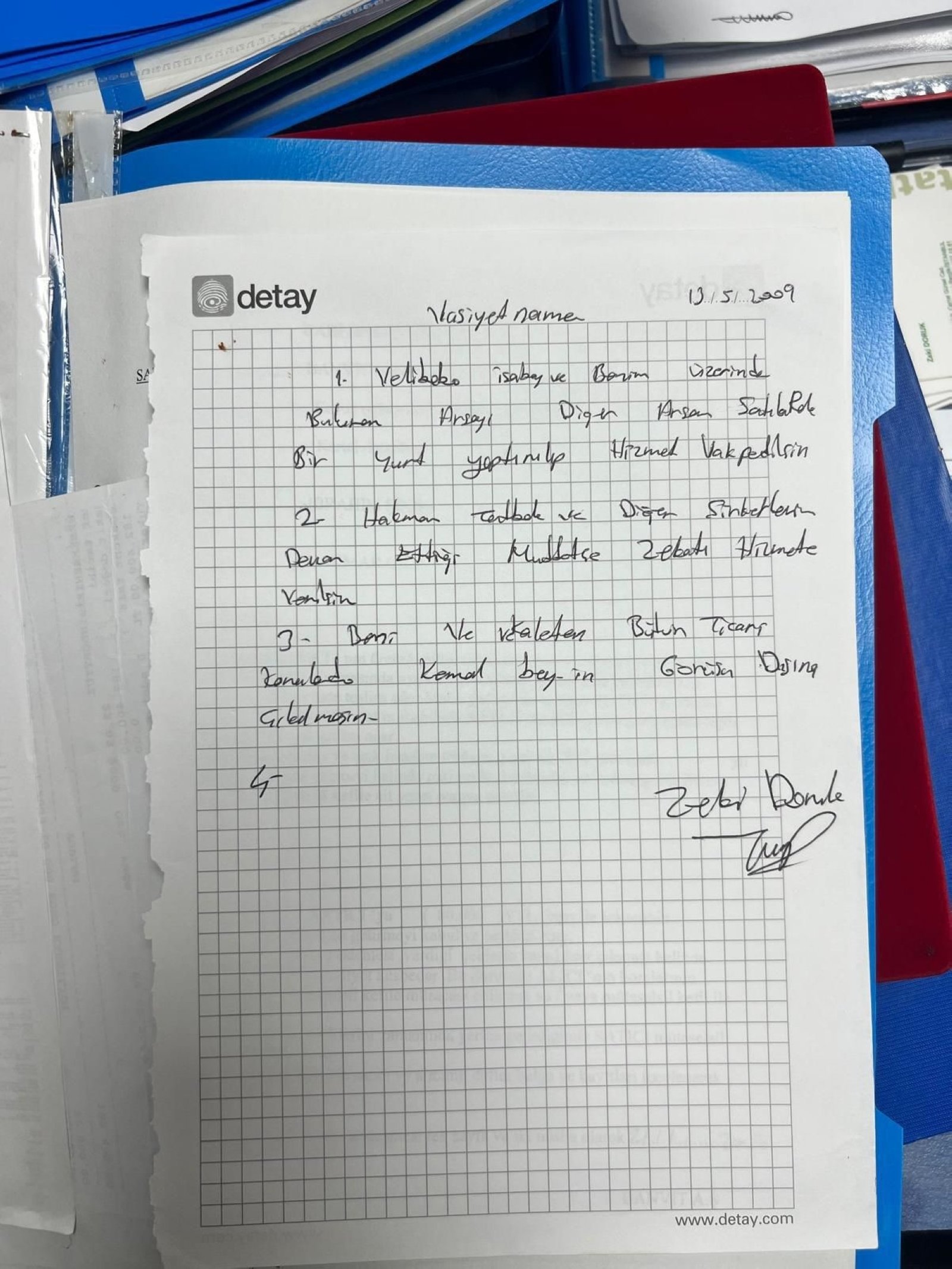
Authorities also found a so-called “talisman prayer,” believed to have been written by FETÖ’s deceased ringleader Fetullah Gülen himself and distributed to select members of the group’s secretive inner circle. Doruk had reportedly kept the prayer along with his will in the safe, telling associates, “It was Gülen who elevated me, my fortune is his.”
When first detained, Doruk deliberately gave the wrong combination to HAKMAR’s corporate safe to prevent access, officials said.
A court-appointed trustee (kayyum) has now been assigned to manage the affairs of both HAKMAR and TATBAK, as well as an additional 19 companies owned by Doruk that were found to have funneled finances to FETÖ’s domestic and international networks.
Authorities say the businessman was regularly transferring funds to FETÖ operatives in Türkiye under the instructions of the group’s overseas leadership.
Doruk’s 22 companies now under trustee control include firms operating in agriculture, education, food, retail, and construction.
Politics
Erdoğan, al-Sharaa discuss Israeli aggression in phone call
President Recep Tayyip Erdoğan held a phone call with Syrian President Ahmad al-Sharaa on Thursday to discuss recent developments in Syria following Israeli airstrikes, the Presidential Communications Directorate said in a statement.
During the call, President Erdoğan condemned Israel’s attacks on Syrian territory, saying they are unacceptable and pose a serious threat to regional stability.
He emphasized that Türkiye will continue to support the Syrian people, as it has consistently done in the past.
Erdoğan also welcomed the recently established cease-fire between Druze communities in southern Syria, expressing Türkiye’s satisfaction with efforts to de-escalate tensions.
For his part, Syrian President al-Sharaa thanked Erdoğan for Türkiye’s ongoing support for Syria’s political unity, territorial integrity, and sovereignty.
The two leaders also exchanged views on regional cooperation and the importance of maintaining peace and security across Syria.
Ankara played a critical role in facilitating the cease-fire following Israeli strikes that threatened to endanger peace not only in Syria but the whole region, sources said Thursday.
In the process, Türkiye has undertaken significant efforts and diplomacy, engaging with several countries as well as Syrian officials.
National Intelligence Organization (MIT) chief Ibrahim Kalın discussed the situation with interlocutors in the U.S., Syria and Israel, security sources said. He was also in close contact with the U.S. Special Representative for Syria Thomas Barrack. The leader of the Druze community was another figure with whom Kalın has negotiated to achieve the cease-fire.
Politics
Türkiye, Arab nations unite in support of Syria’s sovereignty
Türkiye and 10 Arab countries on Thursday reiterated their commitment to Syria’s sovereignty, unity, stability and security, denouncing foreign interference and condemning ongoing Israeli strikes, according to a joint statement released by Saudi Arabia’s Foreign Ministry.
The statement was issued by the foreign ministers of Türkiye, Jordan, the UAE, Bahrain, Saudi Arabia, Iraq, Oman, Qatar, Kuwait, Lebanon and Egypt.
The ministers stressed support for Syria’s security, unity, stability and sovereignty and rejection of all foreign interference in its affairs.
They also welcomed a recent cease-fire agreement in the southern province of Suwayda and called for its full implementation.
The joint statement described the cease-fire deal as essential to preserving Syria’s unity, protecting civilians, and upholding the rule of law and state sovereignty.
It welcomed Syrian President Ahmad al-Sharaa’s commitment to holding accountable all individuals responsible for abuses against residents in Suwayda.
The 11 countries also voiced support for all efforts aimed at restoring security and state authority across Suwayda and the entire country, while rejecting violence, sectarianism, incitement, and hate speech.
The ministers strongly condemned repeated Israeli airstrikes on Syrian territory as blatant violations of international law and Syria’s sovereignty.
They warned that the attacks undermine Syria’s security, stability, territorial integrity, and the safety of its citizens, while obstructing the Syrian government’s efforts to build a stable future that meets the aspirations of the Syrian people.
The countries emphasized that Syria’s stability is essential to broader regional security and should remain a shared priority.
They also called on the international community to support Syria’s reconstruction process and urged the U.N. Security Council to uphold its legal and moral responsibilities by ensuring Israel’s complete withdrawal from occupied Syrian territories, halting all hostilities and interference in Syria, and enforcing U.N. Resolution 2766 as well as the 1974 Disengagement Agreement.
The statement comes a day after Israeli forces launched air raids on more than 160 targets across four Syrian provinces – Suwayda, Daraa, Damascus, and Damascus countryside – killing three people and injuring 34 in the capital alone.
Israel has cited “protection of Druze communities” as a pretext for its attacks in Syria, especially in the country’s south.
However, most Druze leaders in Syria have publicly rejected any foreign interference and reaffirmed their commitment to a unified Syrian state.
Following the fall of Assad in December 2024, Israel intensified its air campaign in Syria and declared the buffer zone between the two countries defunct alongside the 1974 Disengagement Agreement.
Politics
Türkiye, UAE sign 7 strategic deals to deepen ties
Türkiye and the United Arab Emirates on Wednesday signed seven bilateral agreements during a high-level visit by UAE President Sheikh Mohammed bin Zayed Al Nahyan, marking a major step forward in deepening strategic cooperation across key sectors.
The signing ceremony, held in Ankara, followed a one-on-one meeting between President Recep Tayyip Erdoğan and Sheikh Mohammed, as well as the inaugural session of the Türkiye-UAE High-Level Strategic Council.
“We laid the foundation of our strategic partnership during my 2023 visit to Abu Dhabi,” Erdoğan said. “Thankfully, this partnership has started to bear fruit across nearly every sector — from trade and infrastructure to defense, energy, technology, and transportation.”
Erdoğan said bilateral trade has grown rapidly, noting that while a few years ago the two sides wondered whether a $10 billion trade volume was within reach, they now aim to exceed $20 billion this year. “With decisive steps from both sides, I’m confident we’ll meet our medium-term target of $40 billion,” he added.
The Turkish president said the two leaders also had a productive exchange on regional issues, particularly the situation in Gaza.
Among the agreements signed was a memorandum of understanding on investment cooperation in tourism and hospitality, signed by Ahmet Burak Dağlıoğlu, head of the Investment Office of the Presidency of Türkiye, and UAE Investment Minister Mohamed Hassan Al Suwaidi.
Other MoUs included cooperation in pharmaceuticals, industry and manufacturing, and food and agriculture.
A separate agreement on the mutual protection of classified information was signed by Türkiye’s National Defense Minister Yaşar Güler and UAE State Minister for Defense Affairs Mohammed Mubarak Al Mazrouei. Another memorandum on cooperation in polar research was signed by Türkiye’s Industry and Technology Minister Mehmet Fatih Kacır and UAE Industry and Advanced Technology Minister Sultan Ahmed Al Jaber.
Additional deals covered the formation of a joint consular committee and cooperation in polar research, with signatories from both countries’ respective ministries.
The two leaders have recently been in close contact, especially over the Iran-Israel tensions and the ongoing Israeli attacks on Palestinians in Gaza.
Türkiye and the UAE have repaired ties over the last three years in a rapprochement that also saw Ankara mending relations with Saudi Arabia. Since then, the sides have ramped up contacts as they sought to seize opportunities to expand their partnerships and signed deals worth billions in energy, defense and other sectors.
Politics
Türkiye played key role in Syria cease-fire: Sources
Ankara has played a key role in establishing the cease-fire in Syria after Israeli airstrikes targeted the capital, Damascus, as well as Suwayda and Daraa, on the pretext of protecting the Druze community.
In the process, Türkiye has undertaken significant efforts and diplomacy, engaging with several countries as well as Syrian officials.
National Intelligence Organization (MIT) chief Ibrahim Kalın discussed the situation with interlocutors in the U.S., Syria and Israel, security sources said. He was also in close contact with the U.S. Special Representative for Syria Thomas Barrack. The leader of the Druze community was another figure with whom Kalın has negotiated to achieve the cease-fire.
In a televised speech, Syrian interim President Ahmed al-Sharaa also said that despite Israeli interventions targeting civilian and public institutions, “state efforts to restore stability and expel outlaw factions have succeeded.” This would not have happened “without the effective intervention of American, Arab and Turkish mediation, which saved the region from an unknown fate,” he added.
On the other hand, Defense Ministry officials said on Thursday that Israel’s unrestrained actions are destabilizing the region and causing chaos. It must immediately halt aggressive moves that could lead to irreversible consequences.
Turkish forces and personnel on Syrian soil, sent there on anti-terrorist missions along the border, are not facing any setbacks following Israeli airstrikes on Syria, ministry spokesperson Zeki Aktürk told reporters at a briefing in the capital, Ankara.
-
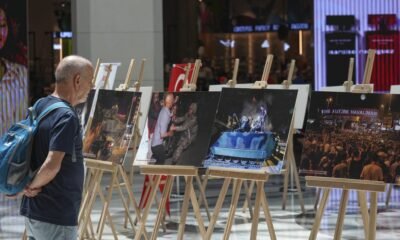
 Economy3 days ago
Economy3 days agoJuly 15 ‘spirit’ seen as catalyst for Türkiye’s economic progress
-
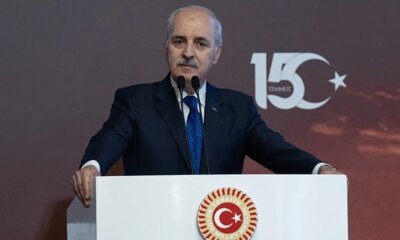
 Daily Agenda3 days ago
Daily Agenda3 days agoParliament Speaker Numan Kurtulmuş: A new constitution should be made
-
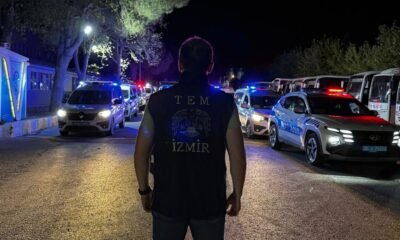
 Politics3 days ago
Politics3 days agoTürkiye clamps down on FETÖ on anniversary of coup attempt
-

 Daily Agenda16 hours ago
Daily Agenda16 hours agoNew Decision in Mattia Ahmet Minguzzi case: The case was postponed to October 2
-
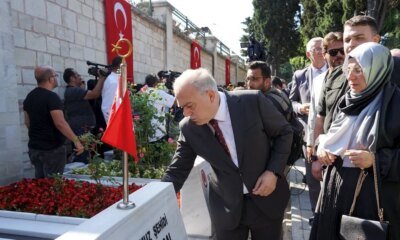
 Daily Agenda3 days ago
Daily Agenda3 days agoTrade Minister Bolat: July 15 is an epic of democracy written in world history
-

 Economy20 hours ago
Economy20 hours agoStudy reveals persistent pay gap for immigrants in major economies
-

 Sports3 days ago
Sports3 days agoSpurs’ Wembanyama cleared for NBA return after blood clot scare
-
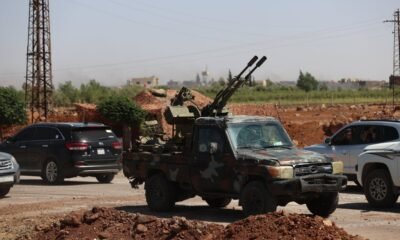
 Politics3 days ago
Politics3 days agoTürkiye urges swift end to violence in S. Syria, calls for dialogue




